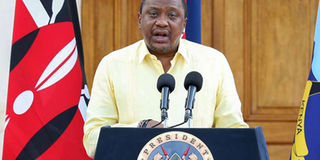Kenyans are asking for food before lockdown, not surprises

President Uhuru Kenyatta addresses the nation on enhanced measures to contain the Covid-19 pandemic, at Nairobi State House on April 6, 2020. PHOTO | PSCU
What you need to know:
- This pandemic chose the worst time to visit Kenyans. It found us still reeling from the shock of job losses and the psychosocial trauma that came with it.
- We can only hope that the economy shall resurrect after this moment of gloom is over, because if it doesn’t, Easter holidays will never be the same again.
After weeks of speculating whether Kenyans would be locked in, out, up or down, the president announced this week that the National Security Advisory Council had asked him to go for a hybrid that would ensure Kenyans continue seeing the sun, and the supermarket cashier.
It must have been an intensely negotiated settlement considering the newspapers had carried screaming headlines of an opinion poll that had concluded that a majority of Kenyans had begged the government for a total lockdown, although the poll did not bother to ask the government whether they were ready to pay our landlords to give us relief food.
While the president’s decision to cut our legs may not have been a popular one, it definitely bought us time to prepare for more radical interventions.
We hope the government can utilise that time well, now that they’re still struggling to utilise the few available personal protective equipment (PPEs) for our frontline healthcare workers.
While it is understandable that everyone was caught flat-footed by this ravaging pandemic, the manner in which the government responded has shown a worrying lack of confidence.
COMPLIANCE STATUS
It has been more than two weeks since Kenyans made passionate pleas to the police to stop using tools and equipment not included in the World Health Organisation (WHO) guidelines in the prevention, management and eradication of the coronavirus pandemic.
We have since seen the Interior Cabinet secretary and his Health counterpart make routine visits to oversight how the police are now handling those coming in and going out of the restricted zones.
The WHO should take notice of this positive progress and revise our compliance status.
If this positive trend continues, we are ready to forgive the government for not telling us why the virus was allowed to mingle freely with Kenyans when an arrest warrant was issued.
During these trying times, we shouldn’t be dwelling on water under the bridge, even though corona made the government to temporarily stop Building Bridges.
That these are unprecedented times is not in question. Everyone is scared because no one knows how long the virus intends to play hide and seek with us, and who is next on its line of fire.
REELING FROM SHOCK
Scientists have been given all the money they need to buy midnight oil to pour on this virus, but until they succeed, we have been asked to stay at home, and wear masks.
Kenyans have no problem cooperating with the government to stop the spread of Covid-19. We will do anything the government asks us to because we trust they know what they are doing, even though it’s difficult to see.
However, what Kenyans are asking from the government is a little show of genuine concern for the suffering poor.
It isn’t too much to ask of the government to always seek expert opinion first before arriving at painful policy decisions that have the potential of disrupting livelihood patterns, and narrow the already thin gap between Kenyans and poverty.
This pandemic chose the worst time to visit Kenyans. It found us still reeling from the shock of job losses and the psychosocial trauma that came with it.
The economy had already nailed us on the cross, and when the government was still looking for the spear to test whether we were still alive, coronavirus came in to finish the crucifixion.
OUT OF TOUCH
We can only hope that the economy shall resurrect after this moment of gloom is over, because if it doesn’t, Easter holidays will never be the same again.
It is, therefore, imperative that before we brace for tougher times ahead, it would help if the president first asked himself why Kenyans are finding it difficult cooperating with recent policy positions advanced by his government.
On several occasions, the Health Cabinet secretary has had to sprinkle his daily briefings with tough-talking lectures on the need for Kenyans to embrace positive behaviour while fighting this pandemic.
This is what happens when people who live in Pluto make decisions for those living on Earth.
Kenyans have starving children to feed and utility bills to pay. We are aware that most of those writing policy for this country only hear about poverty on a podcast, but there is only one enemy everyone is united in fighting right now, and it isn’t poor people.
If the bureaucrats sitting in privileged positions of power are finding it difficult consulting the poor before coming up with lockdown measures to curb the spread of Covid-19, then it’s only fair that we create a new Ministry of Poverty, headed by a homeless Kenyan, who will chair the National Emergency Response Committee on Coronavirus.
We have arrived at this painful decision that for us to flatten the Covid-19 curve faster, we must flatten the inequality curve first.
The author comments on topical issues; [email protected]





